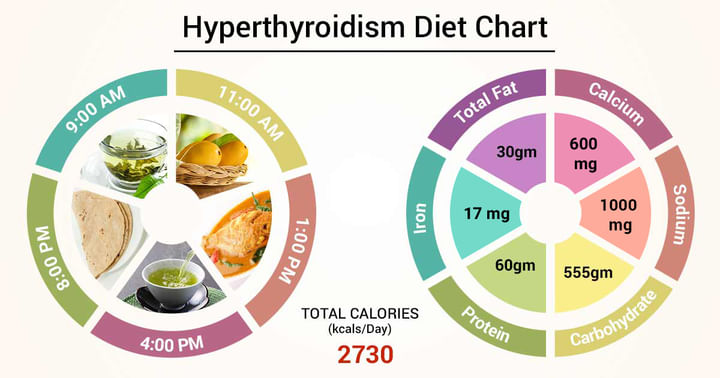Diet Chart For hyperthyroidism
Last Updated: Jan 20, 2025
About
Hyperthyroidism is a condition which causes the enlargement of thyroid gland, hence it starts to produce more thyroid hormones which causes increased metabolism in the body. This high metabolism causes a quick breakdown of carbohydrates and fats and hence the body is unable to store them for a longer period of time. As a result, a person feels more hungry, weakness and fatigue. Other symptoms also include weight loss, increased heart rate, anxiety and a disturbed menstrual flow. However, it is curable with antithyroid medicines and a right hyperthyroidism diet. Hyperthyroidism diet helps in maintaining the metabolism. The food should be high in protein, iron and B vitamin. Foods such as walnuts, wheat, apricots, honey and olive oil fall in this category. Foods high in antioxidant such as cherries, bell peppers, tomatoes and blueberries also help to keep the appetite in control. Avoid junk food, alcohol, red meat, carbonated drinks, caffeine and foods having high level of sugar. Cruciferous foods such as cabbage, cauliflower also decrease the excess thyroid hormone. Also, in order to prevent weight loss, make sure to consume foods such as beans and nuts; foods rich in protein. For non vegan, consume turkey as it contains a lot of proteins and also develops muscles. Although, Hyperthyroidism is a serious problem, but with right Hyperthyroidism diet (in initial stage) and medicine, it can be easily treated and cured.
Diet Chart
| Sunday | |
| Breakfast (8:00-8:30AM) | Vegetable Upma (1 cup) + Green Tea (1 cup) |
| Mid-Meal (11:00-11:30AM) | 1 Mango |
| Lunch (2:00-2:30PM) | Parboiled Rice (1 cup) + Masoor Dal (1 cup) + Fried Lady's Finger (1/3rd cup) + Fish Curry (1/2 cup) + 1/4th Fresh Lime |
| Evening (4:00-4:30PM) | Green Tea (1 cup) + 4 Almonds + 3 Cashews + 5-6 Raisins |
| Dinner (8:00-8:30PM) | 2 Chapati + Mix Veg (1 cup) |
| Monday | |
| Breakfast (8:00-8:30AM) | 2 Chapati + Stir fried Carrot n Beetroot (1 cup) |
| Mid-Meal (11:00-11:30AM) | 2 Chikus |
| Lunch (2:00-2:30PM) | Parboiled Rice (1 cup) + Chana Dal (1 cup) + Mashed Potato (1/3 cup) + Cabbage Curry (1/2 cup) + 1/4th Fresh Lime |
| Evening (4:00-4:30PM) | Green Tea (1 cup) + 4 Almonds + 3 Cashews + 5-6 Raisins |
| Dinner (8:00-8:30PM) | 2 Chapati + Bottle Gourd Curry (1 cup) |
| Tuesday | |
| Breakfast (8:00-8:30AM) | Rice Flakes Poha (1 cup) + Green Tea (1 cup) |
| Mid-Meal (11:00-11:30AM) | 1 Nashpati |
| Lunch (2:00-2:30PM) | Parboiled Rice (1 cup) + Moong Dal (1 cup) + Fried Bitter Gourd (1/3 cup) + Broad Beans Curry (1/2 cup) + 1/4th Fresh Lime |
| Evening (4:00-4:30PM) | Green Tea (1 cup) + 4 Almonds + 3 Cashews + 5-6 Raisins |
| Dinner (8:00-8:30PM) | 2 Chapati + Carrot n Beetroot curry (1 cup) |
| Wednesday | |
| Breakfast (8:00-8:30AM) | 2 Chapati + Daal (1 cup) |
| Mid-Meal (11:00-11:30AM) | Pomegranate (1 cup) |
| Lunch (2:00-2:30PM) | Parboiled Rice (1 cup) + Baked Badi (1 cup) + Fish Curry (1/2 cup) + 1/4th Fresh Lime |
| Evening (4:00-4:30PM) | Green Tea (1 cup) + 4 Almonds + 3 Cashews + 5-6 Raisins |
| Dinner (8:00-8:30PM) | 2 Chapati + Pointed Gourd Curry (1 cup) |
| Thursday | |
| Breakfast (8:00-8:30AM) | Vegetable Upma (1/2 cup) + 1 Fried Fish |
| Mid-Meal (11:00-11:30AM) | Grapes (1 cup) |
| Lunch (2:00-2:30PM) | Parboiled Rice (1 cup) + Shrimp Curry (1/2 cup) + Chana Dal (1 cup) + Fried Potato (1/2 cup) + 1/4th Fresh Lime |
| Evening (4:00-4:30PM) | Green Tea (1 cup) + 4 Almonds + 3 Cashews + 5-6 Raisins |
| Dinner (8:00-8:30PM) | 2 Chapati + Snake Gourd Curry (1 cup) |
| Friday | |
| Breakfast (8:00-8:30AM) | 2 Chapati + Daal (1 cup) |
| Mid-Meal (11:00-11:30AM) | 1 Lemon |
| Lunch (2:00-2:30PM) | Parboiled Rice (1 cup) + Masoor Dal (1 cup) + Masala Pointed Gourd (2pcs.) + Mix Veg. (1/2 cup) + 1/4th Fresh Lime |
| Evening (4:00-4:30PM) | Green Tea (1 cup) + 4 Almonds + 3 Cashews + 5-6 Raisins |
| Dinner (8:00-8:30PM) | 2 Chapati + Fish curry (1 cup) |
| Saturday | |
| Breakfast (8:00-8:30AM) | Rice Flakes Poha (1 cup) + Potato Pakoda (4) |
| Mid-Meal (11:00-11:30AM) | 1 Apple |
| Lunch (2:00-2:30PM) | Parboiled Rice (1 cup) + Chicken Curry (1 cup) + Potato n Pumpkin Curry (1/2 cup) + 1/4th Fresh Lime |
| Evening (4:00-4:30PM) | Green Tea (1 cup) + 4 Almonds + 3 Cashews + 5-6 Raisins |
| Dinner (8:00-8:30PM) | 2 Chapati + Dum Aloo (1 cup) |
Food Items To Limit
- Iodized salt: consumption of iodine can further increase the thyroid hormone production, so it has to be avoided.
- Any vitamins or supplements that contain iodine (especially kelp and dulse)
- Milk or other dairy products including ice cream, cheese, yogurt and butter, Milk chocolate (due to dairy content)- contains high amounts of tyrosine which helps in synthesis of thyroid hormone at an increased extent.
- Seafood including fish, sushi, shellfish, kelp or seaweed- they have to be avoided as they are rich sources of iodine which increases the thyroid hormone production.
- Herbal supplements- might contain high amounts of iodine which has a negative effcet on thyroid gland.
- Foods that contain the additive carrageen, agar-agar, alginate, or nori
- Commercially prepared bakery products that are made with iodate dough conditioners
- FD&C red dye #3 – this appears in maraschino cherries and occasionally as a pink/red artificial color in beverages
- Egg yolks, whole eggs and foods containing whole eggs- rich in iodine and tyrosine.
- Blackstrap Molasses (unsulfured molasses is fine)- contains high amounts of tyrosine which helps in synthesis of thyroid hormone at an increased extent.
- Soy products (soy sauce, soy milk, tofu)- Soy contains isoflavones which has negative effects on the thyroid.
Do's And Dont's
Do's:
- Include whole grain cereals and legumes.
- Fruits and vegetables.
- Prefer home made foods over outside foods.
- Do check for iodine content on food labels.
Don'ts:
- Soy
- Gluten
- fatty foods
- Sugery foods
- Alcohol and caffiene
- avoid smoking
- Avoid restaurant foods since there is no reasonable way to determine which restaurants use iodized salt.
- Limited grain products (ie noodles, pasta, pastries)
- Limited amounts of beef, chicken and turkey
Food Items You Can Easily Consume
- Non-iodized salt or non-iodized sea salt may be used as desired
- Egg whites
- Homemade bread made with non-iodized salt and oil (not soy!) instead of butter or milk or commercially-baked breads which do not contain iodate dough conditioners, dairy, or eggs
- Fresh fruits and vegetables
- Frozen vegetables
- Grain, cereal products and pasta without high iodine ingredients
- Canned fruit
- Natural unsalted nuts and nut butters (peanut, almond, etc)
- Sodas, beer, wine, lemonade, fruit juices
- Coffee or tea. But remember, no milk or cream and no soy-based non-dairy creamer!
- Popcorn popped in vegetable oil or air popped, with non-iodized salt
- Black pepper, fresh or dried herbs and spices, all vegetable oils
- Sugar, jam, jelly, honey maple syrup
- Matzoh crackers
References
- Soskín S, Mirsky IA. Medical Treatment of Hyperthyroidism with a High Fat Diet. Journal of the American Medical Association. 1938 Apr 23;110(17):1337-8. [Cited 27 June 2019]. Available from:
- Kass PH, Peterson ME, Levy J, James K, Becker DV, Cowgill LD. Evaluation of environmental, nutritional, and host factors in cats with hyperthyroidism. Journal of veterinary internal medicine. 1999 Jul;13(4):323-9. [Cited 27 June 2019]. Available from:
- Thyroid and Diet Factsheet- British Thyroid Foundation [Internet]. btf-thyroid.org 2019 [Cited 06 August 2019]. Available from:
Table of content
Find Dietitian/Nutritionist near me
Ask a free question
Get FREE multiple opinions from Doctors



